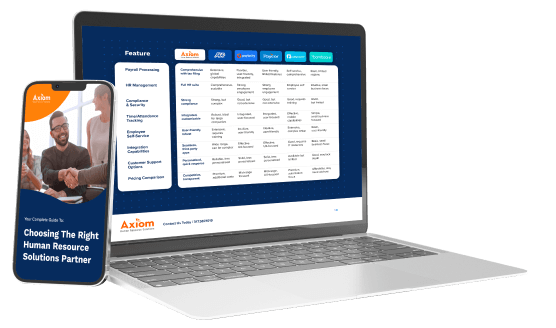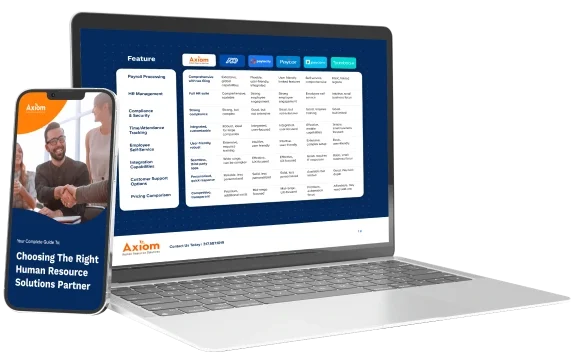Frequently Asked Questions
How can HRMS software effectively streamline our current manual HR processes?
HRMS software can effectively streamline your current manual HR processes by automating tasks such as payroll, employee records management, and reporting, thereby reducing errors and saving time, which allows HR teams to focus on strategic initiatives.
How to streamline HR processes?
Streamlining HR processes involves implementing efficient systems and tools that automate tasks, enhance communication, and improve data management. This can lead to reduced administrative burdens and a more engaged workforce, ultimately optimizing overall HR effectiveness.
How do PEO payroll services ensure the accuracy of employee payroll processing?
PEO payroll services ensure the accuracy of employee payroll processing by utilizing advanced technology, implementing strict compliance measures, and conducting regular audits to verify data integrity and accuracy throughout the payroll cycle.
How does BMA payroll ensure accuracy and compliance in payroll processing?
BMA payroll ensures accuracy and compliance in payroll processing through meticulous data validation, regular audits, and adherence to current labor laws and tax regulations, thereby minimizing errors and maintaining up-to-date compliance standards.
How to streamline HR processes with automation?
Streamlining HR processes with automation involves implementing technology solutions that simplify tasks such as payroll, employee onboarding, and performance management. By automating these functions, organizations can enhance efficiency, reduce errors, and improve overall employee engagement.
How can outsourcing streamline my companys HR operations and processes?
Outsourcing can streamline your company's HR operations and processes by allowing you to delegate administrative tasks to specialized providers, thereby enhancing efficiency, reducing costs, and enabling your internal team to focus on strategic initiatives that drive employee engagement and retention.
What technology solutions can streamline our HR processes in the automotive industry?
Technology solutions that can streamline HR processes in the automotive industry include integrated HR management systems, automated payroll software, and employee engagement platforms, all designed to enhance efficiency and improve workforce management.
How can HR executive hub help streamline our recruitment and onboarding processes effectively?
The HR Executive Hub can effectively streamline your recruitment and onboarding processes by automating workflows, enhancing candidate tracking, and providing centralized communication tools, ultimately improving efficiency and ensuring a smoother transition for new hires.
How can payroll numbers help streamline internal HR and payroll processes effectively?
Payroll numbers can effectively streamline internal HR and payroll processes by providing accurate data for decision-making, enhancing compliance, and automating repetitive tasks, which ultimately leads to improved efficiency and reduced administrative burdens.
How do you ensure accuracy and compliance in payroll processing?
Ensuring accuracy and compliance in payroll processing involves implementing robust software systems, regular audits, and staying updated on labor laws. Our dedicated team meticulously reviews payroll data to prevent errors and maintain adherence to regulations.
What are the best ways to streamline HR processes for my Pasadena business?
The best ways to streamline HR processes for your Pasadena business include implementing automated HR management software, enhancing employee engagement through regular feedback, and centralizing payroll solutions to reduce administrative burdens and improve efficiency.
How can HR software help streamline payroll processes for small businesses?
HR software can significantly streamline payroll processes for small businesses by automating calculations, ensuring compliance with tax regulations, and reducing manual errors. This efficiency saves time and resources, allowing businesses to focus on growth and employee engagement.
How can HR outsourcing help streamline my recruitment and onboarding processes effectively?
HR outsourcing can effectively streamline your recruitment and onboarding processes by providing specialized expertise, advanced technology, and efficient workflows. This allows your organization to focus on core activities while ensuring a smooth and compliant hiring experience for new employees.
How can HR software streamline payroll processes for small businesses effectively?
HR software can effectively streamline payroll processes for small businesses by automating calculations, ensuring compliance with tax regulations, and facilitating timely payments, which reduces errors and saves valuable time for HR teams.
What features enhance HRMS software efficiency?
The features that enhance HRMS software efficiency include automated payroll processing, streamlined employee onboarding, robust reporting tools, and self-service portals, all of which simplify HR tasks and improve overall workforce management.
How can automation improve HR process accuracy?
Automation improves HR process accuracy by minimizing human error, ensuring consistent data entry, and streamlining workflows. This leads to more reliable payroll processing, accurate employee records, and enhanced compliance with regulations, ultimately fostering a more efficient HR environment.
What are the benefits of outsourcing HR tasks?
The benefits of outsourcing HR tasks include increased efficiency, cost savings, access to specialized expertise, and the ability to focus on core business functions. This approach allows organizations to enhance their HR processes and improve employee engagement.
How does technology simplify payroll processing?
Technology simplifies payroll processing by automating calculations, reducing errors, and streamlining data management. This efficiency allows HR teams to focus on strategic initiatives while ensuring timely and accurate employee compensation.
What metrics measure HR process effectiveness?
The metrics that measure HR process effectiveness include employee turnover rates, time to hire, employee engagement scores, and training return on investment (ROI). These indicators help assess how well HR strategies support workforce retention and productivity.
How can HRMS support compliance in payroll?
HRMS supports compliance in payroll by automating tax calculations, ensuring adherence to labor laws, and providing timely updates on regulatory changes, thereby reducing the risk of errors and penalties for organizations.
What tools assist in streamlining HR operations?
Tools that assist in streamlining HR operations include integrated HR management systems, payroll software, applicant tracking systems, and employee engagement platforms. These solutions automate processes, enhance communication, and improve overall efficiency in managing human resources.
How can data analytics improve HR decision-making?
Data analytics can significantly enhance HR decision-making by providing insights into workforce trends, employee performance, and retention rates. This data-driven approach enables organizations to make informed decisions that optimize talent management and improve overall employee engagement.
What role does employee feedback play in HR?
The role of employee feedback in HR is crucial for enhancing workplace culture and driving organizational improvement. It provides insights that help HR tailor policies, boost employee engagement, and foster a more productive environment.
How can cloud solutions enhance HR management?
Cloud solutions can enhance HR management by streamlining processes, improving data accessibility, and facilitating real-time collaboration. This leads to more efficient payroll management, better employee engagement, and ultimately, a more effective workforce retention strategy.
What are best practices for payroll accuracy?
Best practices for payroll accuracy include regularly updating employee information, implementing automated payroll systems, conducting thorough audits, and ensuring compliance with tax regulations. Consistent training for HR personnel also enhances accuracy and reduces errors.
How can integration improve HR software functionality?
Integration can significantly enhance HR software functionality by enabling seamless data sharing between systems, streamlining processes, and improving accuracy. This leads to better decision-making, increased efficiency, and a more cohesive employee experience.
What challenges arise in HR process automation?
The challenges that arise in HR process automation include integration issues with existing systems, resistance to change from employees, data security concerns, and the need for ongoing maintenance and updates to ensure effectiveness and compliance.
How can mobile solutions aid HR management?
Mobile solutions can significantly aid HR management by enabling real-time access to HR tools, streamlining communication, and enhancing employee engagement, ultimately fostering a more efficient and responsive workforce.
What strategies optimize recruitment and onboarding processes?
Strategies to optimize recruitment and onboarding processes include leveraging technology for streamlined applications, enhancing candidate engagement through personalized communication, and implementing structured onboarding programs that facilitate smooth transitions for new hires, ultimately improving retention and productivity.



